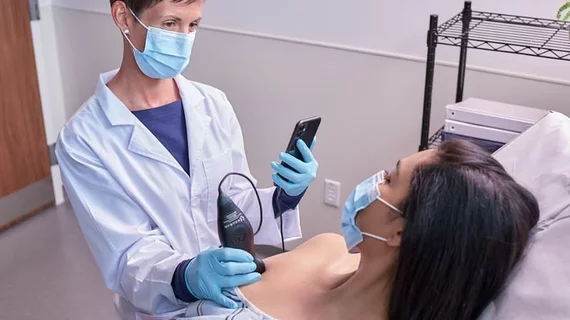Specialized lung AI tool cleared for U.S. sales
A popular marketer of handheld ultrasound devices has won FDA approval for an AI-enabled B-line quantification tool for use with patients suspected of having compromised lung function.
Butterfly Network of Burlington, Mass., says the software, called Auto B-line Counter, needs a sonogram of only six seconds to perform its function.
Announcing the go-ahead April 3, the company explains that B-lines are the vertical lines that, on lung scans, detect and localize fluid that may tip off clinicians to such diagnoses as congestive heart failure, chronic obstructive pulmonary disease, pneumonia and COVID-19.
Butterfly says the tool uses an algorithm that quantifies B-line images by not only counting lines but also instantly calculating percentages of indicative rib spaces.
The company says its technique is more reliable than individual line-counting methods and allows ultrasound operators to “simply place the probe and receive a reliable number count right on their screen.”
Butterfly says it trains and validates its AI models on more than 3.5 million diverse and de-identified ultrasound images and cine loops stored in its proprietary Butterfly Cloud.
Butterfly Network founder and interim CEO Jonathan Rothberg, PhD, says the company’s continuing goal is to give healthcare professionals and, eventually, consumers “a real time full color, annotated, window into the human body.”
The newly cleared B-line quantification tool, Rothberg adds, “empowers providers to assess lung conditions faster and with more confidence—and, in turn, will aid in earlier detection, diagnosis and treatment of cardiovascular diseases.”
Butterfly Network expects the tool to become available in the U.S. early this summer.
Full announcement here.

